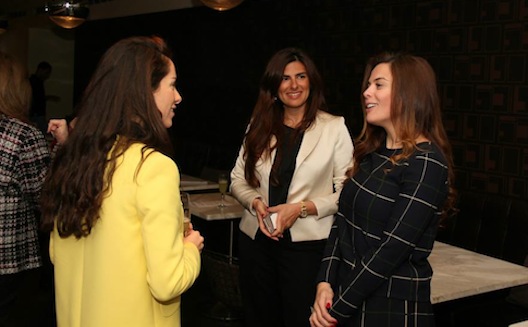Lebanon's Blessing Foundation to scale its network of women in business to the region

Last month, 85 business owners – many strangers to each other – gathered in an upscale Beirut café. Each was in a specific stage of their business journey – for some, their business was just an idea; others were looking for ways to expand an already successful enterprise. Some presented their business ideas or a challenge they were facing, others gave opinions and advice on new directions, and everyone discussed the idea of mentorship, and the role it should play in the development of entrepreneurs and their ideas.
Sounds like any normal networking or mentorship event, right? Well, no: all of these business owners and entrepreneurs were women, brought together by The Blessing Foundation, a network of Lebanese women in business.

“In this country men have more access to professional networks than women,” says Blessing Foundation founder Rima El Husseini (the foundation is named after her chocolate company Blessing which operates region-wide). Indeed, in Lebanon, all professional networks per se are networks for men, given the low numbers of female business owners or executives. Based on her experience working in the US and Lebanon (and throughout the Middle East), “it’s much easier for women to ask for help from other women,” says El Husseini.
Since its launch in 2012, El Husseini (picutured below, center) and her team have continuously iterated their model based on feedback and results from each cycle, with support from partnerships with the US Embassy in Lebanon and Vital Voices, a global NGO aiming to supporting potential women leaders. “At the beginning, there wasn’t a lot of structure,” the entrepreneur says. “We did the matching of mentors and mentees based on what we thought they needed to work on…. sometimes that didn’t work,” she admits.
 The next season’s process was “more
democratic,” she laughs. This time, mentees were allowed to select
the mentors with whom they wanted to work, but “we still didn’t
structure the relationship,” so as to give each pair maximum
flexibility to create whatever kind of partnership is most
beneficial for them.
The next season’s process was “more
democratic,” she laughs. This time, mentees were allowed to select
the mentors with whom they wanted to work, but “we still didn’t
structure the relationship,” so as to give each pair maximum
flexibility to create whatever kind of partnership is most
beneficial for them.
Their discussions obviously pertain to each of their businesses and professional lives, but they can also extend to work-life balance, a challenge women face all over the world. “For a mentor to be able to help a mentee they need to go into their private life… if they’re comfortable with the relationship this comes naturally.” For some mentorship pairs, this relationship has extended to friendship and even to business partnership. One pair opened a café together in Beirut’s Verdun district; others have been friends and mentors for years now, El Husseini says.
El Husseini is the first to admit, however, that the women in the network are of a very particular segment of Lebanese – Beiruti – society: they’re highly educated, urbane, well traveled, from relatively wealthy backgrounds, with basic business and networking skills. The foundation’s next move comes as a response to the difficulty so far the team has had serving “people who have skills but don’t know how to apply them,” who might be “less educated” than most of the women currently in the network, says El Husseini.
In the coming months, El Husseini and her team will launch an “open market platform where women in business throughout the region can apply to sell products online,” she says, whether or not they have a formal business plan, a scalable model, mentors, or any of the other trappings of modern-day internet entrepreneurs. “The idea is to leverage the developed skillsets of our mentors and mentees already in the network to help less highly skilled women, perhaps from rural areas, from lower socio-economic backgrounds.”
El Husseini is confident about the future of the Blessing Foundation website, based on the strong relationships that have been fostered so far by the network, connections that came easier than she had been expecting. “I thought that Lebanese women and women in the region would be hesitant to give back to their communities. I thought that women don’t help others; I was pleasantly surprised to see that this isn’t the case,” she says.
While the focus of the Blessing Foundation, and its upcoming online platform, is to empower Arab women in business, El Husseini sees her work as benefitting everyone in the long run. “We’re trying to create this platform in order to help create an ecosystem full stop,” she says. “Women and men entrepreneurs both need an ecosystem above all else.” Empowering half the region’s population to start and scale businesses, beyond being socially responsible, is just smart strategy.
All images from The Blessing Foundation Facebook page.


